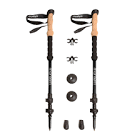The Benefits of Hiking Poles
When it comes to hiking, having the right gear can make all the difference in your outdoor adventure. One piece of equipment that is often overlooked but can greatly enhance your hiking experience is a pair of hiking poles.
Improved Stability and Balance
Hiking poles provide added stability and balance, especially when navigating challenging terrains such as steep inclines or rocky trails. By using hiking poles, you can distribute your weight more evenly and reduce the strain on your legs and joints, ultimately helping you maintain better balance and prevent falls.
Reduced Strain on Joints
With each step you take while hiking, your knees and ankles bear a significant amount of impact. Hiking poles help absorb some of this impact by transferring it to the poles, reducing strain on your joints and minimizing the risk of injuries. This is particularly beneficial for hikers with knee or joint issues.
Increased Endurance
Using hiking poles can also help increase your endurance on longer hikes. By engaging your upper body muscles while walking with poles, you can alleviate some of the workload from your lower body, allowing you to conserve energy and hike for longer periods without feeling as fatigued.
Aid in Uphill and Downhill Climbs
When tackling steep uphill climbs or descending tricky downhill slopes, hiking poles provide added support and stability. They can help you maintain a consistent pace while ascending and provide extra stability when descending to prevent slips or falls. Adjusting the length of the poles based on the terrain can further enhance their effectiveness.
Multi-Purpose Use
Besides providing support during hikes, hiking poles have versatile uses. They can be used to probe uncertain terrain, clear spider webs from paths, set up makeshift shelters, or even serve as tent poles in emergencies. Their lightweight and collapsible design make them easy to carry and store when not in use.
In Conclusion
Hiking poles are a valuable accessory that can significantly enhance your hiking experience by improving stability, reducing strain on joints, increasing endurance, aiding in climbs, and offering multi-purpose use beyond just walking support. Whether you’re a beginner or an experienced hiker, consider adding hiking poles to your gear list for a more enjoyable and safer outdoor adventure.
Understanding Hiking Poles: Benefits, Selection, and Comparisons
- Do hiking poles actually help?
- What is a good hiking pole?
- What is the difference between hiking poles and trekking poles?
- What is the difference between hiking poles and cane?
Do hiking poles actually help?
Hiking poles are indeed beneficial for hikers of all levels. They provide added stability, balance, and support, especially on challenging terrains such as steep inclines or rocky trails. By distributing weight more evenly and absorbing impact, hiking poles can reduce strain on joints and muscles, ultimately helping to prevent injuries and enhance overall hiking performance. Whether you’re navigating uphill climbs, descending tricky slopes, or simply looking to increase endurance on longer treks, hiking poles can make a noticeable difference in your hiking experience. Their versatility extends beyond walking support, offering various practical uses that can come in handy during outdoor adventures. Overall, investing in a pair of hiking poles is a wise choice for those looking to improve comfort, safety, and enjoyment while exploring the great outdoors.
What is a good hiking pole?
When looking for a good hiking pole, several factors come into play to ensure you find the right fit for your needs. A good hiking pole should be lightweight yet sturdy, providing reliable support on various terrains without adding unnecessary weight to your pack. Adjustable poles are ideal, allowing you to customize the length based on the terrain and your height. Look for ergonomic grips that offer comfort and prevent hand fatigue during long hikes. Anti-shock features can help reduce impact on joints, especially on downhill descents. Additionally, consider durable materials like aluminum or carbon fiber for longevity and reliability in rugged outdoor conditions. Ultimately, a good hiking pole is one that suits your hiking style, enhances your stability and endurance, and contributes to a more enjoyable hiking experience overall.
What is the difference between hiking poles and trekking poles?
When it comes to outdoor activities like hiking and trekking, the terms “hiking poles” and “trekking poles” are often used interchangeably, leading to confusion among enthusiasts. While both types of poles serve a similar purpose of providing support and stability during walks or hikes, there are subtle differences between them. Hiking poles are typically designed for casual day hikes and offer basic features such as adjustable height and wrist straps. On the other hand, trekking poles are more robust, geared towards longer treks or challenging terrains, and may come with additional features like shock absorption systems and ergonomic grips. Ultimately, the choice between hiking poles and trekking poles depends on the intensity and duration of your outdoor activities, with each type catering to different needs and preferences.
What is the difference between hiking poles and cane?
When comparing hiking poles to a cane, the key difference lies in their intended use and design. Hiking poles, also known as trekking poles, are specifically designed for outdoor activities like hiking, trekking, and backpacking. They typically feature adjustable lengths, ergonomic grips, and durable materials to provide stability, balance, and support on various terrains. On the other hand, canes are primarily used for assistance with walking or mobility support due to injury or disability. Canes often have a single point of contact with the ground and may not be as sturdy or versatile as hiking poles designed for rugged outdoor conditions. While both hiking poles and canes serve a supportive function, their distinct designs cater to different needs and activities.




